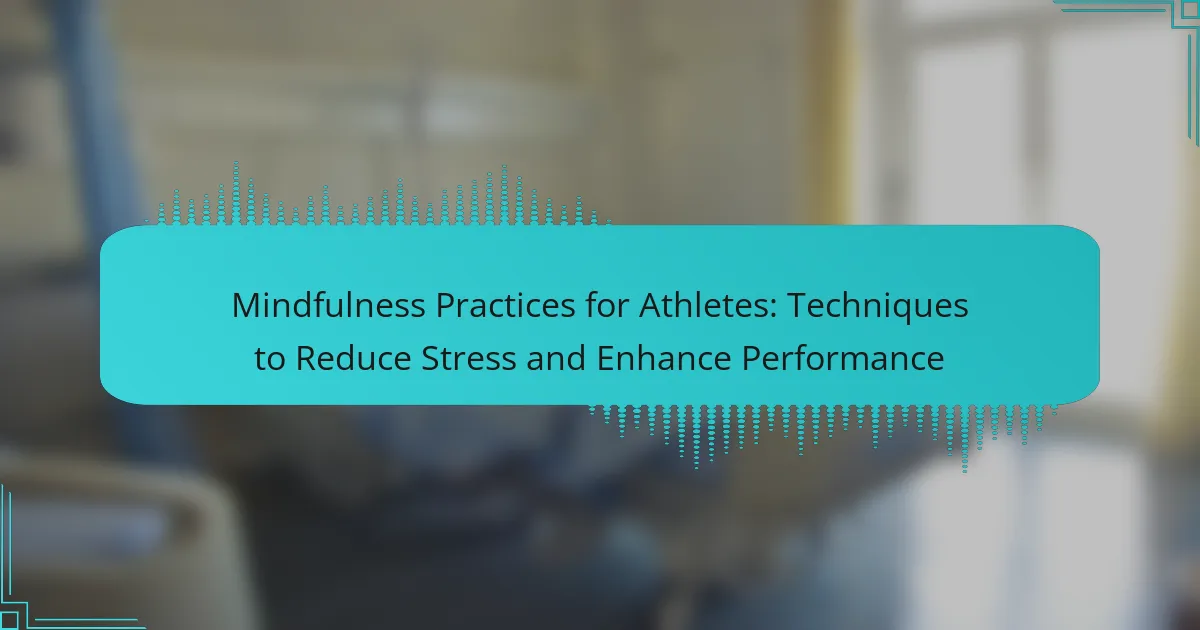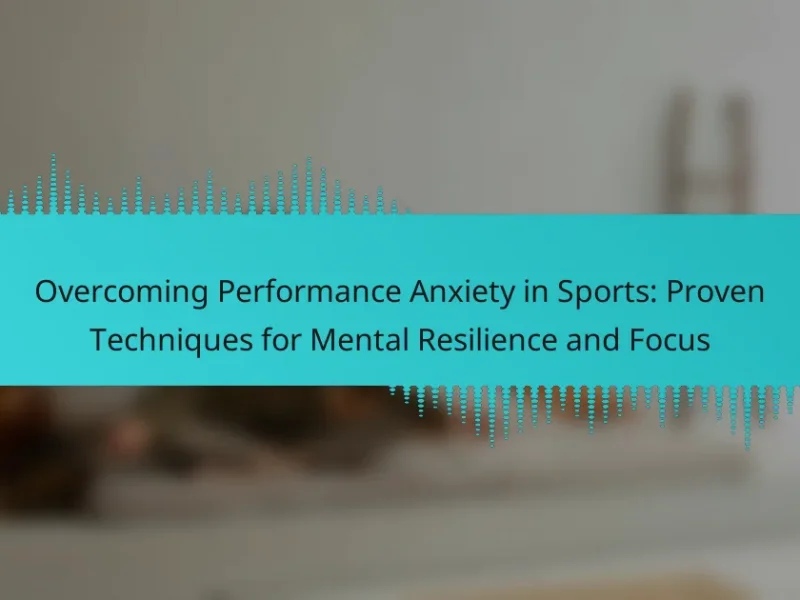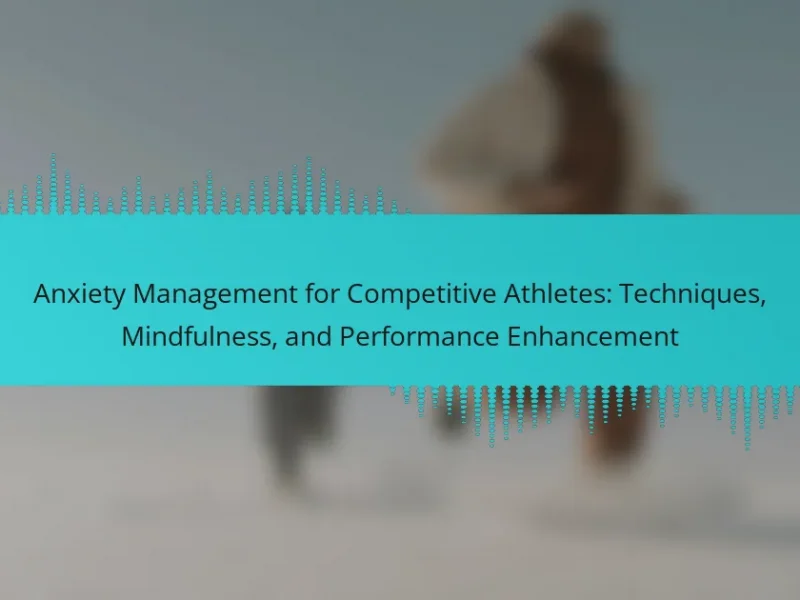Mindfulness practices for athletes can significantly reduce stress and enhance performance. Key techniques include focused breathing to regulate emotions, visualization for mental rehearsal, body scanning for injury prevention, and mindful movement to improve flexibility. These practices build mental resilience, enabling athletes to maintain focus and perform under pressure. Regular mindfulness engagement can lead to overall improvements in athletic performance.

What are the key mindfulness practices for athletes?
Mindfulness practices for athletes include techniques that effectively reduce stress and enhance performance. Key practices are focused breathing, visualization, body scanning, and mindful movement.
Focused breathing helps athletes centre their thoughts and regulate emotions. Visualization enables them to mentally rehearse performances, improving confidence. Body scanning promotes awareness of physical sensations, aiding in injury prevention. Mindful movement incorporates techniques like yoga, enhancing flexibility and concentration.
These practices foster mental resilience, allowing athletes to perform under pressure and maintain focus during competition. Regular engagement in mindfulness can lead to improved overall athletic performance.
How does mindfulness impact athletic performance?
Mindfulness significantly enhances athletic performance by improving focus, reducing stress, and fostering resilience. Athletes who practice mindfulness report increased concentration, which directly correlates with better performance outcomes. Research indicates that mindfulness techniques, such as meditation and breathing exercises, can lower anxiety levels, allowing athletes to perform under pressure. Additionally, mindfulness cultivates a positive mindset, contributing to improved motivation and commitment to training. These practices not only enhance mental well-being but also lead to measurable improvements in physical performance metrics.
What are the universal benefits of mindfulness for athletes?
Mindfulness offers athletes numerous universal benefits, including reduced stress, enhanced focus, and improved performance. Practicing mindfulness helps athletes manage anxiety, leading to better concentration during competitions. Research indicates that mindfulness can increase emotional resilience, allowing athletes to recover from setbacks more effectively. Additionally, it promotes self-awareness, enabling athletes to understand their strengths and weaknesses. Regular mindfulness practices can also enhance overall well-being, contributing to a more balanced athletic lifestyle.
How does mindfulness improve focus and concentration?
Mindfulness significantly enhances focus and concentration by promoting present-moment awareness. This practice reduces distractions, allowing athletes to engage fully in their performance. Techniques such as deep breathing and body scanning help athletes centre their thoughts, improving mental clarity. Research shows that consistent mindfulness practice can lead to a 30% increase in attention span, benefiting athletic performance.
What role does mindfulness play in emotional regulation?
Mindfulness plays a crucial role in emotional regulation by helping athletes manage stress and enhance focus. Mindfulness practices, such as meditation and breathing exercises, allow athletes to develop greater awareness of their thoughts and emotions. This heightened awareness enables them to respond to stressors more effectively, reducing anxiety and improving performance. Research indicates that consistent mindfulness practice can lead to a significant decrease in emotional reactivity, promoting resilience in high-pressure situations. By integrating mindfulness into their training routines, athletes can cultivate a balanced emotional state, ultimately enhancing their overall performance.
How can mindfulness enhance recovery and injury management?
Mindfulness enhances recovery and injury management by promoting mental resilience and reducing stress. Techniques such as meditation and breathing exercises can improve focus and emotional regulation. This practice fosters a positive mindset, which is crucial for athletes facing rehabilitation challenges. Studies show that mindfulness can lead to a 30% reduction in perceived stress levels, aiding faster recovery and injury prevention.
What unique mindfulness techniques can athletes adopt?
Athletes can adopt unique mindfulness techniques such as visualization, body scanning, and mindful breathing. These practices enhance focus and reduce anxiety, ultimately improving performance. Visualization involves mentally rehearsing successful outcomes, which boosts confidence. Body scanning helps athletes connect with their physical sensations, promoting relaxation. Mindful breathing allows for better stress management during competitions, fostering a calm mindset.
What is the role of visualization in mindfulness?
Visualization enhances mindfulness by helping athletes focus, reduce stress, and improve performance. It allows them to mentally rehearse techniques, visualize success, and cultivate a calm mindset. Research shows that imagery can activate brain regions similar to actual performance, reinforcing skills and reducing anxiety. This mental practice is a unique attribute of mindfulness that can lead to significant performance gains in competitive settings.
How can breathing exercises be effectively integrated?
Breathing exercises can be effectively integrated into athletic training by incorporating them into warm-up routines, cool-down periods, and recovery sessions. These exercises enhance focus, reduce anxiety, and improve oxygen flow, contributing to overall performance. Athletes can practice techniques such as diaphragmatic breathing, box breathing, or 4-7-8 breathing to cultivate mindfulness. Regular integration fosters a habit that supports both physical and mental resilience.
What are the benefits of body scan practices for athletes?
Body scan practices enhance athletes’ performance by promoting relaxation, improving focus, and increasing body awareness. These benefits contribute to reduced stress and better mental clarity during competitions. Athletes utilizing body scan techniques report heightened emotional regulation, which leads to improved decision-making under pressure. Additionally, regular practice can enhance recovery by fostering a deeper connection between mind and body, ultimately supporting overall athletic performance.
What rare mindfulness approaches are available for elite athletes?
Elite athletes can benefit from rare mindfulness approaches such as forest bathing, sound meditation, and body scanning. These techniques enhance focus and reduce anxiety, ultimately improving performance. Forest bathing immerses athletes in nature, fostering relaxation and mental clarity. Sound meditation utilises specific frequencies to promote deep relaxation and concentration. Body scanning encourages athletes to connect with their physical sensations, enhancing body awareness and reducing tension. Each approach offers unique benefits tailored to the needs of elite performers.
How can athletes utilize nature-based mindfulness practices?
Athletes can utilize nature-based mindfulness practices to enhance focus and reduce stress. Engaging with natural environments promotes relaxation and mental clarity. Techniques include outdoor meditation, mindful walking, and nature observation. These practices improve emotional well-being and can lead to better athletic performance. Nature’s calming effects lower cortisol levels, which helps athletes manage stress more effectively.
What is the impact of sound and music in mindfulness training?
Sound and music significantly enhance mindfulness training by promoting relaxation and focus. Incorporating specific soundscapes can lower stress levels, improve concentration, and increase overall performance. For example, research shows that ambient music can facilitate deeper meditative states, allowing athletes to harness mental clarity. Unique attributes of sound in mindfulness include its ability to synchronize brain waves, enhancing emotional regulation and cognitive function. As a result, athletes can achieve peak performance through tailored auditory experiences.
How can athletes implement mindfulness into their training routines?
Athletes can implement mindfulness into their training routines through specific techniques that enhance focus and reduce anxiety. Techniques include meditation, breath control, and body scanning.
1. **Meditation**: Spend 10-15 minutes daily practicing mindfulness meditation to improve mental clarity.
2. **Breath Control**: Use deep breathing exercises before training sessions to calm nerves and enhance concentration.
3. **Body Scanning**: Conduct body scan exercises to increase awareness of physical sensations and reduce tension.
4. **Mindful Movement**: Integrate mindfulness into warm-ups and cool-downs by focusing on each movement and its impact.
5. **Visualization**: Practice visualization techniques to mentally rehearse performance scenarios and build confidence.
These practices help athletes stay present, manage stress, and ultimately improve performance.
What steps can athletes take to build a consistent mindfulness practice?
Athletes can build a consistent mindfulness practice by following structured steps. Start by dedicating a specific time each day for mindfulness exercises. Incorporate techniques like deep breathing, body scans, or guided meditations to enhance focus. Set clear goals for your practice, such as reducing anxiety or improving concentration. Utilise apps or resources to track progress and maintain motivation. Engage in mindfulness during training sessions to reinforce the habit. Finally, reflect on experiences regularly to identify benefits and areas for improvement.
How can mindfulness be incorporated into pre-competition rituals?
Mindfulness can be effectively incorporated into pre-competition rituals through focused breathing, visualization techniques, and body awareness exercises. These practices help athletes manage anxiety and enhance concentration. For example, deep breathing can lower heart rates, while visualization can improve confidence by mentally rehearsing performance scenarios. Body awareness exercises, such as progressive muscle relaxation, can also ground athletes, promoting a calm state before competition. Integrating these techniques consistently can lead to improved performance outcomes and reduced stress levels.
What common mistakes do athletes make with mindfulness practices?
Athletes often make mistakes in mindfulness practices by lacking consistency, focusing too much on performance, neglecting breath control, and not personalising techniques. These errors can hinder stress reduction and performance enhancement. Consistency is crucial; sporadic practice limits benefits. Overemphasis on performance can create pressure, counteracting mindfulness. Neglecting breath control may lead to ineffective practice, while failing to adapt techniques to individual needs can diminish effectiveness. Addressing these common pitfalls can significantly improve athletes’ mindfulness experiences.
What expert insights can enhance mindfulness practices for athletes?
Expert insights can significantly enhance mindfulness practices for athletes by integrating techniques that focus on stress reduction and performance optimisation. Techniques such as visualization, breath control, and body scanning can help athletes maintain focus and manage anxiety. Research indicates that athletes who practice mindfulness experience improved concentration and emotional regulation, leading to better performance outcomes. Additionally, incorporating regular mindfulness training sessions can foster resilience, enabling athletes to recover from setbacks more effectively.
What are the best practices for maintaining mindfulness during competition?
To maintain mindfulness during competition, athletes should focus on breath control, visualization techniques, and present-moment awareness. These practices reduce stress and enhance performance by promoting mental clarity. Breath control helps regulate physiological responses to stress, while visualization prepares athletes mentally for competition scenarios. Present-moment awareness encourages athletes to concentrate on their performance rather than distractions. Consistent practice of these techniques fosters resilience and improves overall competitive outcomes.


